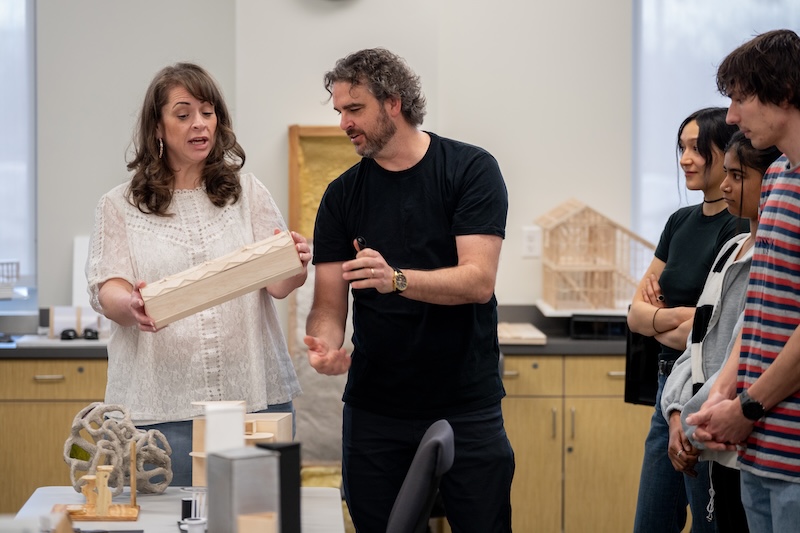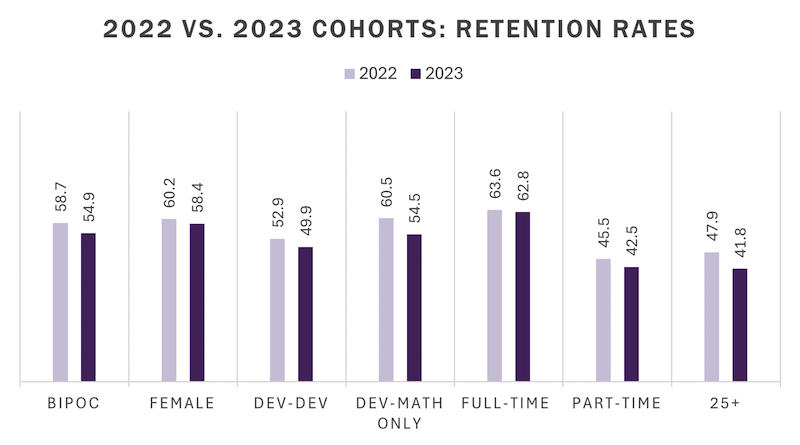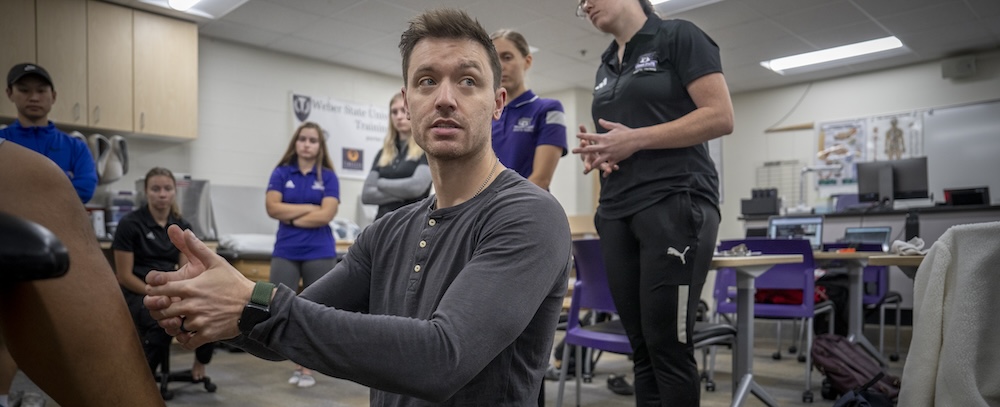Academic Affairs Newsletter
February 2025
Curricular Analysis and Academic Scheduling
Curricular Review Process
Institutional Effectiveness (IE) and the Registrar’s Office have teamed up to offer a suite of tools to help programs identify curricular features that add complexity to students’ path to degree completion. Programs can schedule a review with IE and the Registrar that will cover the following areas:
-
Roadblock courses
-
Course prerequisites, corequisites and overrides
-
CatTracks exceptions
-
Structural review (emphases, tracks, cohorts)
-
Completion efficiencies
-
Course inventory (courses no longer taught, consistently low enrollment)
-
Scheduling issues
-
Lightcast Workforce Analysis
-
GradMAPS (Graduation Major Academic Plans)
A new curricular review process is currently being piloted and will, in the future, become part of the formal program review process. To participate in the pilot, departments should reach out to the Office of IE at oie@weber.edu.

Students study in the Program of Architectural Design on February 4, 2025.
Scheduling Best Practices
Intentional scheduling supports student retention and timely completion. USHE has also set minimum space utilization requirements that Weber State will need to meet to earn new capital funds and improve performance funding. Classrooms should be scheduled for a minimum of 34 hours per week to meet USHE standards. The Registrar’s Office makes the following recommendations in support of efficient, student-centered academic scheduling.
-
Schedule some classes outside the peak scheduling period of 9 a.m. to 12 p.m.
-
Adhere to standard meeting times as much as possible. Using non-standard meeting patterns increases conflicts in students’ schedules, impedes students’ ability to schedule a full load and prevents classrooms from being booked in consecutive time slots.
-
Use the new Non-Standard Course Times Dashboard to identify course sections outside of standard meeting times.
-
-
Labs should follow scheduling patterns as closely as possible. If a lab will take up multiple blocks of time, try to schedule it within two standard blocks so as not to take an extra block unnecessarily.
-
Hybrid sections should be scheduled to fill a standard time block fully. For example, a hybrid section that meets only once a week should still fully utilize a Tuesday - Thursday time block by scheduling one hybrid section in the time block on Tuesday and another at the same time on Thursday.
-
Use right-sized rooms and avoid large classrooms for small classes. Sections with enrollments significantly below classroom capacity should be identified for potential relocation and schedulers should consult with faculty to determine if effective classroom instruction can be supported in a smaller room.
Please contact the Academic Scheduling Office at academicscheduling@weber.edu for help applying these best practices to your department’s scheduling process.
Congratulations to our 2024-2025 Presidential Teaching Excellence Award Recipients
The Presidential Teaching Excellence Award recognizes faculty who are outstanding teachers. Teaching excellence, manifested in various ways, brings significant and valuable results for students and their success.
Recipients
-
Tamara Berghout - Nursing
-
Randall Boyle - Management Information Systems
-
Sam Bryson - Performing Arts
-
Ryan Evans - English
-
Sarah Herrmann - Psychological Science
-
Scott Holland - Automotive Technology
-
Rieneke Holman - Nursing
-
Michelle Jeffs - Criminal Justice
-
Joshua Jensen - School of Computing
-
Demetrios Pagonis - Chemistry and Biochemistry
-
Katarina Pantic - Teacher Education
-
Hannah Stedge - Athletic Training
Strengthening Student Retention: A Shared Commitment to Success

A graph comparing retention decline among specific student groups in the 2022 and 2023 cohorts. BIPOC: Sub-cohort of students that self-identify as black, Indigenous or a person of color; DEV-DEV: sub-cohort of students enrolled in Developmental Math and Developmental English classes; DEV-MATH: sub-cohort of students enrolled in Developmental Math.
Retention is vital to ensuring students thrive, graduate on time and secure meaningful employment. With enrollment growing, it’s more important than ever to support students on their academic journeys. Retention also holds strategic significance as higher education faces declining student populations in the near future. This shift demands a focus on flexibility, student support, career alignment and accessibility to meet the evolving needs of students.
Progress and Challenges
While we have made progress, there is still room for improvement. Our fall-to-fall retention rate for first-time students has steadily increased over the past five years, reaching 59.2% for the 2022 cohort—4.1% higher than in 2018. However, the 2023 cohort saw a decline to 58.2%, with specific groups, including BIPOC students, part-time students and those enrolled in developmental courses, experiencing notable retention drops.
Retention is closely linked to academic performance, with a higher retention rate of the 2023 fall first-year cohort (73.7%) earning a GPA above 2.2 compared to the 2018 cohort (66.9%) in their first semester. This aligns with research showing that first-term GPA and credit hours are the strongest predictors of persistence.
The Impact of Student Engagement
Engagement with student support services boosts retention rates. Students who engage with our Student Access and Success areas retain at a rate of 63.1%, 4.9% higher than the university-wide retention metric. Furthermore, first-time students who engage with these services persist from their first fall to the following spring at a rate of 84.0%, 5% higher than the term-to-term persistence rate for those who do not engage.
Moving Forward
Thanks to university-wide efforts, resources and initiatives, we continue to strengthen academic performance and retention. As we look ahead, we invite you to reflect on retention-focused events held this February and join us in advancing our shared commitment to student success. Together, we can build a brighter future for all students.
Office of Graduate Studies Strengthens Graduate Education

Director, Dr. Conrad Gabler.
As part of its ongoing commitment to academic excellence and student success, Weber State University established the Office of Graduate Studies in June 2023, a strategic initiative aimed at enhancing support for graduate students and programs. This office reflects the university’s dedication to providing the resources, guidance and opportunities necessary for graduate students to excel academically and professionally.
Dr. Melissa NeVille was appointed as the inaugural Director of Graduate Studies. The Office of Graduate Studies works closely with the Graduate Council and university partners to advance a collective vision centered on enhancing student support services, shaping university policies and promoting academic excellence for graduate studies.
Since its inception, the office has implemented several initiatives to enrich the graduate student experience. These efforts include graduate research and conference participation funding, graduate studies scholarships and opportunities for graduate students to engage in the Research & Engagement Symposium. Current academic initiatives include creating an endorsement process for new graduate program proposals, streamlining admissions processes, establishing graduate faculty qualifications, clarifying graduate curriculum guidelines and creating accelerated graduate degree pathways.
For more information on graduate programs, funding opportunities and upcoming events, visit the Office of Graduate Studies website.
